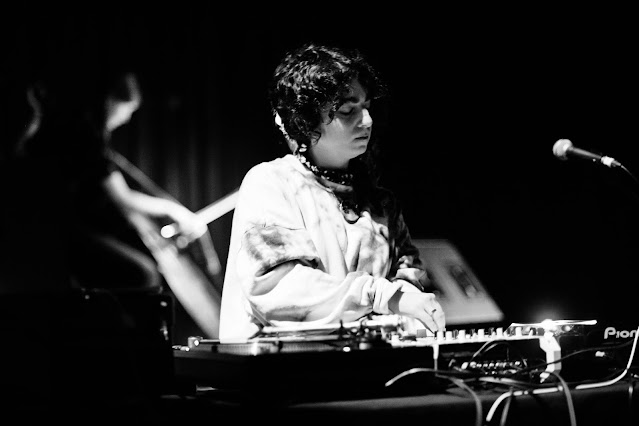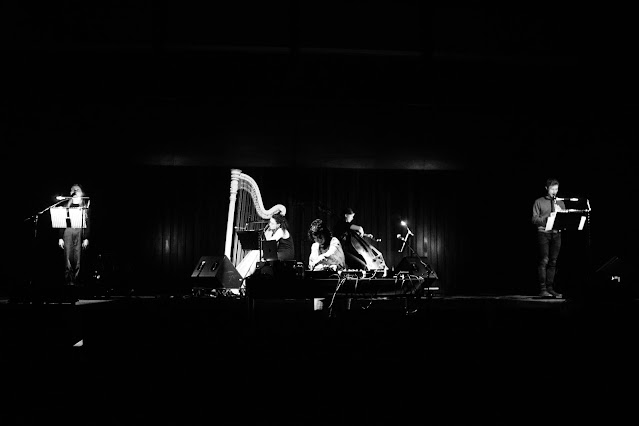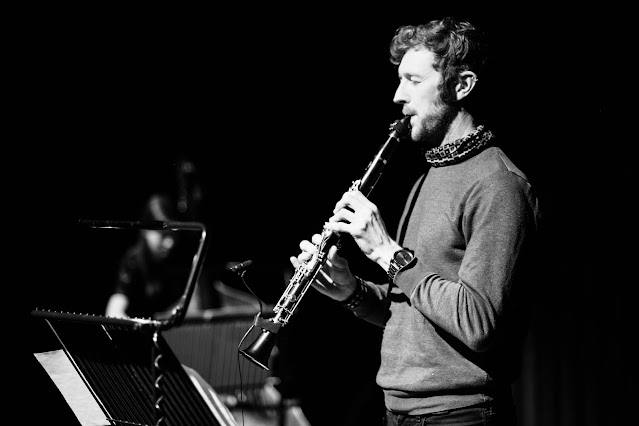 |
| Shiva Fesharecki - Milton Court Concert Hall (Photo Emma Werner) |
Oliver Leith, Stevie Wishart, Mira Calix, Jethro Cooke & The Hermes Experiment, Shiva Feshareki; The Hermes Experiment, Shiva Fesharecki; Milton Court Concert Hall, Barbican
Reviewed by Florence Anna Maunders, 26 January 2023
The Hermes Experiment join forces with Shiva Fesharecki taking us on a journey that combines the ensemble's distinctive sound with Fesharecki's to explore sonic boundaries
At the Barbican's Milton Court Concert Hall on 26 January 2023, The Hermes Experiment (Anne Denholm - harp, Marianne Schofield - double bass, Oliver Pashley - clarinet, Héloïse Werner – soprano) presented a programme that took them from Oliver Leith's Uh huh, Yeah, Stevie Wishart's Eurostar - a journey between cities in sound, and Mira Calix's DMe, to the group's own collaboration with Jethro Cooke, Metropolis and ending with a new collaboration with Shiva Feshareki (composer, turntables, electronics), TRANSFIGURE.
The concert opened with the wonderfully laconic and understated Uh huh, Yeah by Oliver Leith. The whole first half was planned and intended to be an introduction to the extended deep listening of the second half, and this strangely melancholic and resigned work set the tone from the very beginning, with Werner's usually dramatic and characterful voice restricted to repeating the words of the title (the only text of the piece) while the gentle and wistful instrumental music gradually slid downwards and ran out of steam.
 |
| The Hermes Experiment and Shiva Fesharecki - Milton Court Concert Hall (Photo Emma Werner) |
Wishart's Eurostar is probably the ensemble's most performed piece. Written for the Hermes Experiment in 2016, they have performed in frequent programmes since. The musicians' easy familiarity with this complex music, and with each other as a group, was apparent, and it was an absolute pleasure to watch this quartet of virtuosos demonstrate just how well they can gel together as a unit, while still retaining the individuality of a fistful of soloists.
The third work of the evening, DMe by the sadly missed Mira Calix (1969-2022) brought some welcome humour, wit and excitement into the programme. Based on fragments of Instagram conversations, the quartet demonstrated just how subtly and adroitly they can respond to each other as musicians, with a seamless interaction and intertwining of dialogue, sung lines and instrumental duets, trios and ensembles. The pairing of Pashley's clarinet with Schofield's bass, in particular, was beautifully coordinated, and they almost radiated with the joy of absolutely nailing a series of unison runs
Ending the first half was another Hermes Experiment favourite – the semi-improvised Metropolis, created in tandem with Jethro Cooke. Always a fascinating piece, with a fantastically kaleidoscopic montage of London sounds interacting with the live musicians on the stage, it's been really intriguing to hear how the quartet have reacted differently with their live response in each performance to the fixed nature of the recorded sounds.
 |
| The Hermes Experiment: Oliver Pashley - Milton Court Concert Hall (Photo Emma Werner) |
The second half of this concert was entirely taken up with the premiere of composer and turntablist Shiva Feshareki's new long-form commission for the ensemble – TRANSFIGURE. In this piece, Feshareki joined the quartet on stage, along with a substantial array of electronic gear, laid out around her turntables in the centre. Behind her, dispersed across the width of the Milton Court stage, the four members of the Hermes Experiment were deliberately displaced and isolated from each other spatially and, when the music began after an infinitely long anticipatory inhalation of silence, also isolated as performers. This was music which would not be hurried. Immersive, densely layered and built on endless minute variations of repeated phrases, Feshareki's ambisonic techniques sent waves of electronic sound looping and swirling around the space.
She describes her composition as being shaped around "several different journeys, happening at the same time", and this was immediately and starkly apparent in the obsessively repetitive material of the four acoustic sound-sources – each of whom seemed to exist in their own space and time. The epically extended duration of the piece seemed to distort the flow of time. Like waves, the bass and harp rose and fell, and rose and fell again. Werner's crystal clear, wordless soprano kept pulling the ear in one direction, chanting her autolytic prayers while, like a priestess directing the whole ineffably mystical ritual, Feshareki summoned musical ghosts and spirits from her electronic altar to send them dancing, shimmering and spinning around the room.
Thirty-five minutes lasted a day and a night and no time at all. Eventually we were returned to a new silence, transformed from the anticipatory silence of the opening to the listening, expectant stillness of a shared experience.
Reviewed by Florence Anna Maunders
Never miss out on future posts by following us
The blog is free, but I'd be delighted if you were to show your appreciation by buying me a coffee.
Elsewhere on this blog
- Part of her musical journey: violinist Esther Yoo chats about recording the Barber and Bruch concertos - interview
- Mangling Médée: why are stylistically appropriate performances of Cherubini's opera so rare? - feature
- Faces in the Mist: the first disc devoted to Richard Peat's striking and evocative music - record review
- Lyricism, melancholy & sadness: pianist Ruth McGinley & composer Neil Martin collaborate on Aura - record review
- Style and elegance: with Bach-Abel Society, Les Ombres take us back to the elegant evenings of the Bach-Abel concerts in 18th-century London - record review
- Party! London's LGBT+ community choir, the Pink Singers celebrate 40 years at the Cadogan Hall - concert review
- Aural Adventures: the Colin Currie Quartet and Liam Byrne launch Sound Unwrapped at Kings Place - concert review
- Advocating for a sense of classicism: conductor Alexander Shelley on recording the music of Robert Schumann, Johannes Brahms and Clara Schumann - interview
- Handel the European: two concerts showcasing the diversity & imagination of Handel's cantatas - concert review
- Intercourse of Fire and Water: Idlir Shyti in programme for solo cello that mixes late Romanticism with contemporary - record review
- Music, Migration & Mobility: the story of émigré musicians from Nazi Europe in Britain - exhibition review
- Home

.jpg)






%20Craig%20Fuller.jpg)


No comments:
Post a Comment